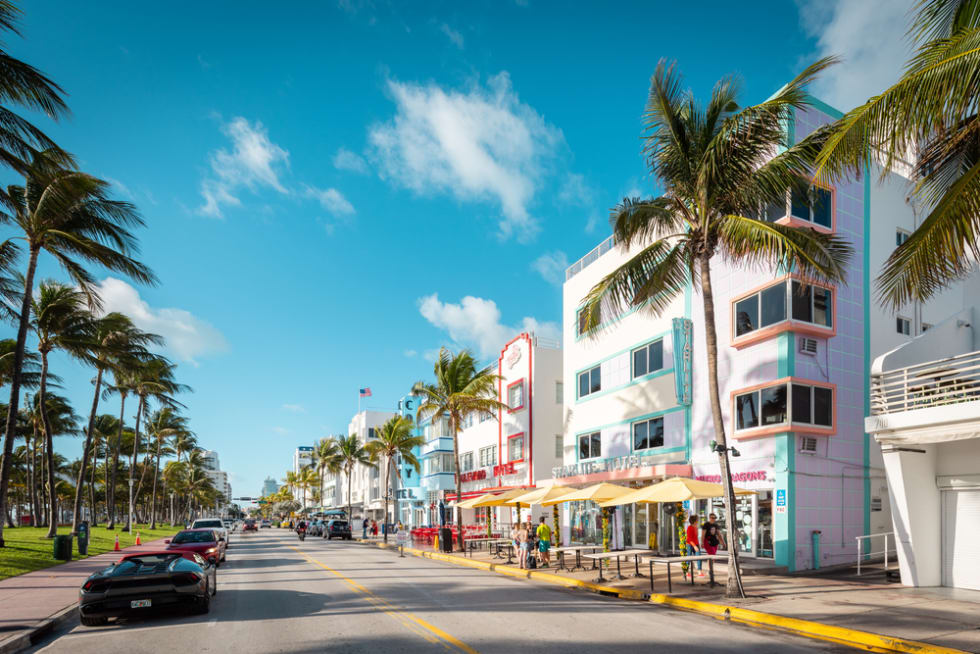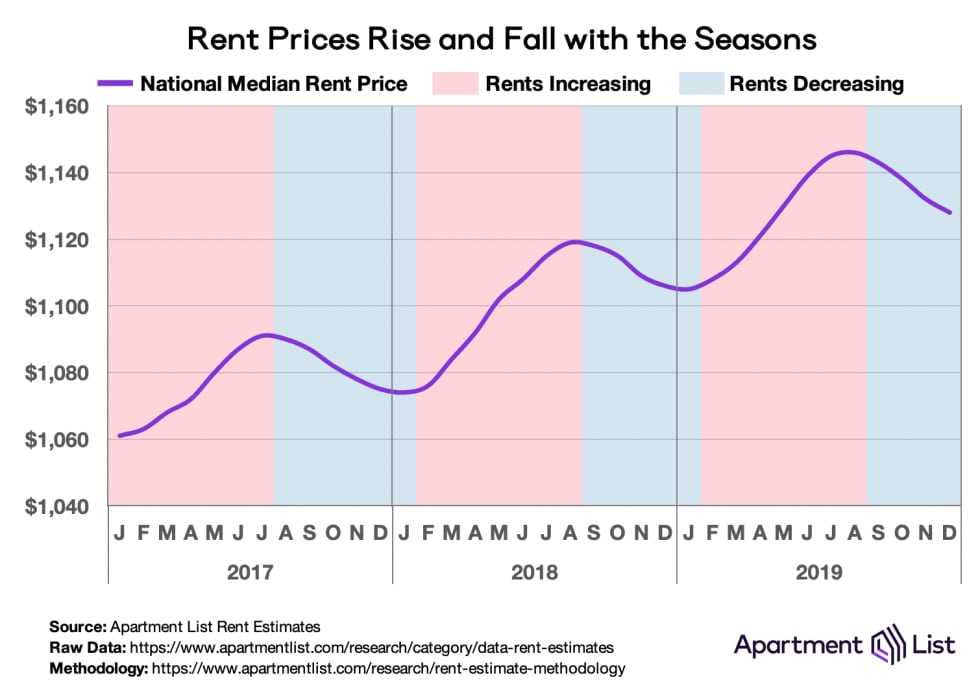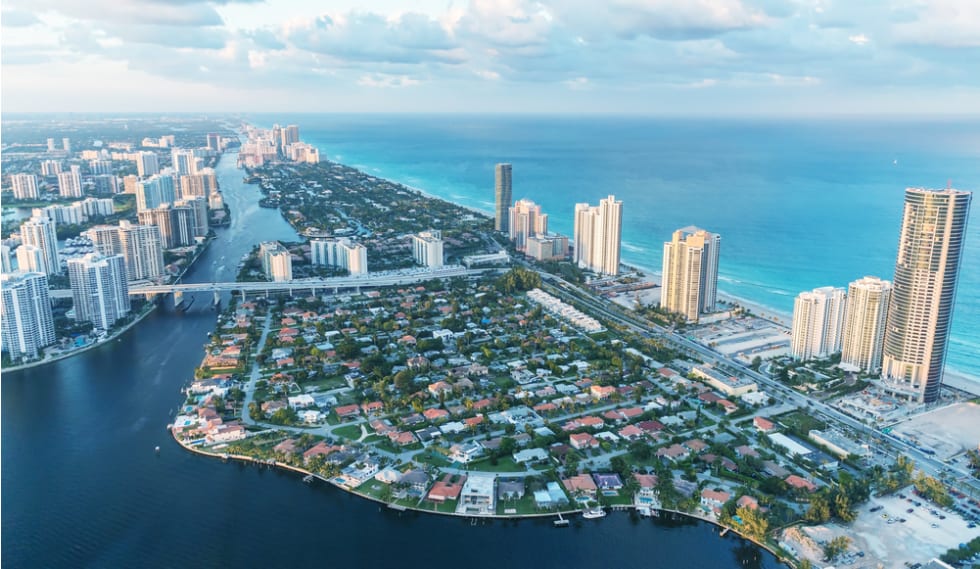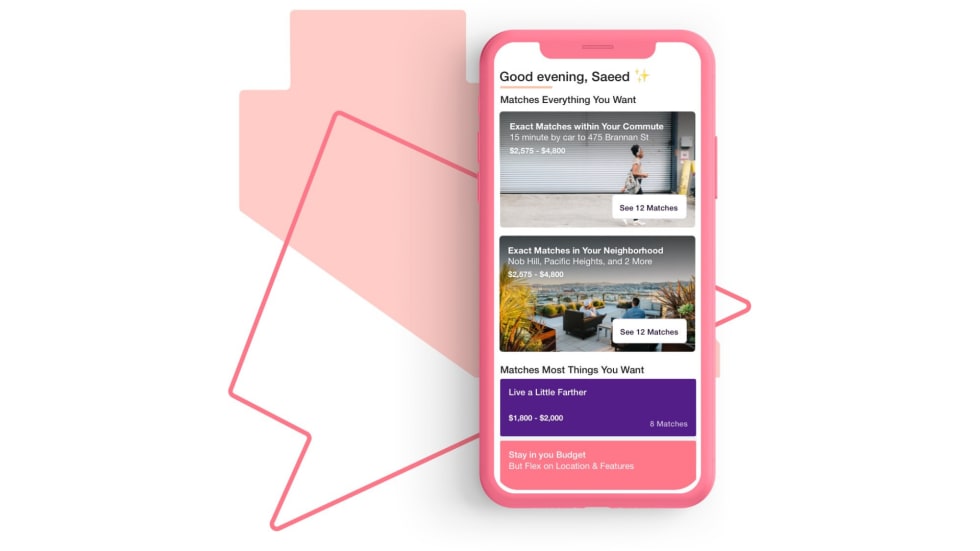- 105 units available
- Studio • 1 bed • 2 bed
- Amenities
In unit laundry, Patio / balcony, Dishwasher, Pet friendly, Garage, Stainless steel + more

Miami is known for its spectacular white-sand beaches, dynamic nightlife, and thriving modern art scene. As you can imagine, the quality of life is pretty excellent in the Magic City. With unbeatable weather, an affordable cost of living, and entertainment galore, Miami is a great place to consider if you’re looking to relocate.
As you start your search, you can figure out how to find an apartment in Miami on your own or choose to use our guide to simplify the process and make sure you find the best rental possible.
Here's how you can find the best neighborhood and apartment amenities in Miami.

Miami regularly hits the top of the list of the best places to live in the state. With a mixture of Latin flavors, unbeatable nightlife, and breathtaking beaches, it’s no wonder this city has continued to be so popular.
It’s no surprise that there are so many restaurants and entertainment options to choose from in Miami, including major sports franchises. So, if you’re looking to make a move to Miami, you’ll want to start now. We recommend looking into some of the best neighborhoods in Miami to get a better idea of where you’d like to call home.
Here's where to get started!
Known as one of the ritziest neighborhoods in Miami, Coral Gables is one of the best places in the metropolitan area to call home. It’s in Coral Gables that you will find stunning grottoes and towers that make up the famous 1920s Venetian Pool that was carved from a rock quarry.
But Coral Gables has more to offer than just the flashy lifestyle. Here you’ll also find some of the city’s best schools and educational centers, making it an excellent neighborhood for families. There are also plenty of shopping options around Coral Gables, including Miracle Mile and Merrick Park.
Best of all, Coral Gables is so centralized you are close to everything in this neighborhood. The airport, beaches, and financial district of Miami are all within close proximity of Coral Gables.
Another popular and upscale Miami neighborhood is Coconut Grove. One of the unique distinctions of Coconut Grove is that it is one of the oldest continuously inhabited neighborhoods in the state. Ongoing revitalization efforts turn more commercialized space into new areas for thriving young professionals to call home.
This neighborhood is filled with outdoor dining options and boutique shops in the CocoWalk mall that attract residents and visitors alike. Otherwise, you can escape the hustle and bustle of the mall by visiting the iconic Vizcaya Museum and Gardens or the Barnacle Historic State Park, both located in Coconut Grove.
If you’re looking for the high-rise lifestyle of Miami, Aventura is an excellent neighborhood for you to consider. With nearly 3,000 businesses in this Miami neighborhood alone, you can fulfill your shopping fix here.
The Aventura Mall is one of the biggest the country offers, with countless upscale shopping and major retailers to choose from.
In addition to the luxury living, you can also enjoy the convenience of being centrally located in Aventura. This neighborhood provides easy I-95 access and is just ten minutes away from Brickell financial center and Downtown Miami.
In the heart of all things Miami, you’ll find South Beach, filled with glitz and glam. For the night owls, South Beach is the place to be. You’ll quickly find that the nightlife and club scene here has no problem partying until the wee hours of the morning.
In addition to clubs, South Beach also boasts a unique art deco neighborhood, where you'll find even more entertainment, restaurant, and shopping options.
If you want to live in South Beach but avoid the tourist-filled areas, check for apartments South of Fifth Street. You’ll have all the South Beach luxuries without the intense party-goers walking the streets at all hours of the night.
Wynwood is an up-and-coming neighborhood in Miami that has seen a recent resurgence. Once filled with warehouses, today, you’ll find craft breweries galore in Wynwood. You might even hear Wynwood being referred to similarly to Williamsburg in Brooklyn.
The streets of Wynwood include everything from nightclubs to pop-up parties, restaurants, and bars. This neighborhood overflows with creativity, with unique apartment buildings and condos constantly emerging.
One of the focal points of Wynwood is Wynwood Walls, the neighborhood’s popular outdoor museum. Renowned street artists have crafted beautiful large-scale pieces here.

Considering moving to Miami? Before you get started packing your things, you'll want to first learn about the average rent prices in the area.
Compared to last month, Miami rents have increased by 3.4% and are up by 25.96% compared to the previous year. Here's more information to help you determine your budget:
Figuring out how to find an apartment in Miami is the first step of the process. Of course, it's typically in your best interest to also seek out a cheap apartment while you’re at it. Finding an affordable place to live in a major city like Miami isn’t always easy. Thankfully, we're here to help you by providing you with all the resources you’ll need to find a quality and affordable Miami apartment.
You’ll need first to figure out how to budget for your first apartment. Your current financial situation is unique, and therefore your budget should match that. From a generalized approach, though, here are some of the main items you’ll want to be sure to budget for with your new Miami apartment:
The budgeting process may seem a bit overwhelming at first, but it’s important to knock it out early on to weed out options that are outside of your means. If you’re worried about saving some money, there are a few ways to help reduce some of your costs. For example, you might want to try looking for different move-in specials or take advantage of renting seasonality if you can.

You might not be familiar with renting seasonality, so we want to teach you the ropes. Seasonality is prevalent in the rental market across the country. You’ll find that seasonality can impact rent prices significantly, especially so in Miami. If you’re looking to find a more affordable apartment, you’ll want to keep an eye on the rental trends in seasonality and time your move to Miami just right.
According to rental trends, more apartments are available during the winter months since people tend to be caught up in the holidays and therefore less interested in moving. In the same regard, people are more likely to move during the summer, making the rental market more competitive.
It’s safe to assume that apartments become more expensive in Miami during the summer versus the winter. Knowing this information will help you during your apartment searches in finding a more affordable rental situation. Learn more about the best time to start searching for an apartment.
Learn the steps to finding an apartment in Miami! Here's the process:
Another factor to keep in mind as you begin your apartment search is your budget. If you’re not sure how to budget for rent, you can start by checking out the 30% rule for starters.
According to the 30% rule, no more than 30% of your gross income, or pre-taxed monthly take-home pay, should go towards your monthly rent. Therefore, if you want to determine how much rent you can afford based on your annual income, divide your gross annual salary by 40.
To determine what your minimum gross income should be when moving to Miami you can use the 30% rule backward. For example, if you’re looking for a one-bedroom apartment, the average rent price in Miami is $2,578. Use the 30% rule to determine your minimum gross income by multiplying the average rent price by three, meaning your gross income should be $7,734 per month or $92,808 annually.
The 30% rule gives you an idea of what your budget should look like. Keep in mind, though, that it works best as a baseline only. In addition to standard living costs, you’ll also have to account for hidden rental costs that may arise through the process.
So, if you’re wondering how much apartment rent you can really afford, you’ll need to break down some of these expenses as well. Start by taking a closer look at some of the hidden apartment expenses, including:
Within your budget, you should also account for your specific financial circumstances, including how they might change with your move. In doing so, you may realize that the 30% rule doesn't quite apply to you if you have other high bills aside from your rent, such as student loans or medical expenses.
We want to help you determine how much monthly rent you can afford, hidden costs and all. We have carefully designed a Rent Calculator by putting together tons of research just for renters. You can better understand what type of rental budget you are working with as you begin your apartment hunt.
Miami is an incredible city with a wide range of rental options, from modern luxury high rises to traditional condo buildings. After establishing your budget and starting your search, the next step is narrowing your search. Figuring out your priorities regarding specific amenities will help you to cut down on some of your options.
You’ll need to list needs versus wants in terms of amenities for your new Miami apartment. Include all the amenities you love, such as bike storage, dedicated outdoor space, onsite laundry, bike storage, or proximity to public transportation.
Once you know what you are looking for, you can prioritize your list, including your needs versus wants. Save yourself time, in the long run, by spending more time on this process upfront.

With so many great options to choose from, when it comes to finding the best neighborhood in Miami, it will ultimately come down to personal preference. Consider the overall vibe of the community while also factoring in things like walkability and convenience. Renters with families or with pets might want to consider neighborhoods with more outdoor options or bigger space.
If you don’t require as much space, though, you may prefer to be closer to work or more centralized in the middle of everything. If this is the case for you, consider a downtown or downtown adjacent neighborhood as the ideal neighborhood in Miami.
Determine which environment is best for you by prioritizing your desire for accessibility to extracurriculars. Things like what types of options you’re interested in are important to think of before signing your next lease in Miami.
Your next apartment in Miami should factor in more than just your dream location, such as things like your commute time to and from work.
Miami's walk score is 78, while its transit score is 57. Biking is another mode of transportation worth considering in Miami, as the city has earned a bike score of 65. If you have a vehicle or plan to purchase one before your move, these specific rankings may not necessarily be as crucial to you.
Miami-Dade County’s public transportation consists of the Metrobus, Miami Trolley, Metrorail, Metromover, and Tri-Rail.
Before you sign a lease to your new Miami apartment, ensure you know exactly what you are getting yourself into by taking part in an apartment tour. During the tour, you will get to see all of the apartment’s amenities firsthand and apply on the spot if you decide that you like it.
In case you fall in love with the apartment during the tour, you’ll want to keep your essential renter materials readily available. Always prepare for your apartment tours ahead of time by bringing the following items with you:
Landlords and property managers accept all different forms of payments for application fees. As such, you’ll want to make sure you know ahead of time what your landlord will accept so that you can have it ready for your tour.
They may accept any payment type or be particular and request cash, credit card, or check. Find out this information ahead of time to have the proper payment form if you decide to move forward with the application process.
Another crucial step is taking the time to make sure you know how the application process works. Gathering your necessary materials BEFORE your tour will help keep you ahead of the game.
As you go through your apartment tour, take time to check that all amenities function correctly. If you find something from the listing that isn’t working correctly, don’t be afraid to ask questions.
Speaking of questions, it’s always a good idea to ask plenty of them during your apartment tour. It’s an even better idea to jot down a list of questions ahead of time so that you can be prepared on the spot. You’ll want to ask imperative questions about things such as property rules about pets, painting, etc.
If you’re not too sure what questions to ask, check out our list of 20 questions to ask when renting an apartment. See if any of these commonly asked questions apply to your rental situation and jot them down on your list.

A successful apartment tour means you are interested in making it your home. Once you’ve found your new Miami apartment and have completed a successful tour, you’ll be ready to apply!
The quickest and easiest way to begin the application process is by making sure you show up to your tour as well prepared as possible. Even still, the landlord or property manager may request additional resources from you during the application process.
For example, your landlord or property manager may request rental references with your application. When it comes to rental references, you typically want to include your previous landlords. Always reach out to them ahead of time so they can prepare for the call and respond in a timely manner. Keep yourself one step ahead of your competition and boost your chances of getting into your apartment quicker by using this strategy.
If you don’t have any previous rental history for your application, don’t worry. Most landlords and property managers will accept personal references as an alternative. Just be sure to ask when the time comes.
According to a rental fraud report by Apartment List, 25.6% of renters in Miami alone have encountered an apartment listing they suspected was fraudulent. 7.9% of those renters have lost money from these rental scams. When searching for an apartment, be sure to exercise caution and follow these tips for avoiding rental scams.

Your apartment hunting process should be an enjoyable one, even if you might feel a bit overwhelmed initially. We want to congratulate you on starting your search for a beautiful new apartment and life in Miami!
Here's how it works: We’ll start by taking a few minutes to get to know you a little better. We will ask you to answer a few simple questions, helping us find the best matches explicitly tailored to what you're looking for. Then, we’ll take that information to mix and match your personalized results to help make it easy to discover places with the perfect combination of price, location, and amenities for you.

In unit laundry, Patio / balcony, Dishwasher, Pet friendly, Garage, Stainless steel + more
In unit laundry, Patio / balcony, Granite counters, Dishwasher, Pet friendly, Parking + more